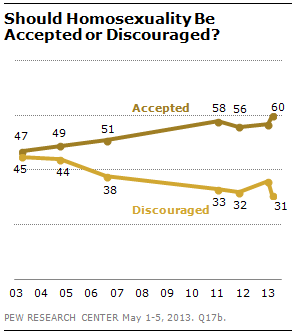 Religious belief continues to be an important factor in opposition to societal acceptance of homosexuality and same-sex marriage.
Religious belief continues to be an important factor in opposition to societal acceptance of homosexuality and same-sex marriage.
Overall, the share of Americans who say that homosexuality should be accepted by society has increased from 47% to 60% over the past decade, while the percentage saying it should be discouraged has fallen from 45% to 31%.
Yet among those who attend religious services weekly or more, there continues to be slightly more opposition than support for societal acceptance of homosexuality. And when the nearly one-third of Americans who say homosexuality should be discouraged are asked in 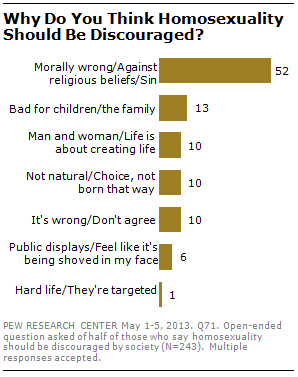 an open-ended question why they feel this way, by far the most common reason –given by 52% – is that homosexuality conflicts with their religious or moral beliefs.
an open-ended question why they feel this way, by far the most common reason –given by 52% – is that homosexuality conflicts with their religious or moral beliefs.
A 62-year-old man said: “My religious background taught me that this was something that was taboo and not accepted.” A 32-year-old woman described her reasons for why homosexuality should be discouraged this way: “It clearly states in the Bible that it goes against God’s teachings.”
Much smaller percentages cite other reasons, such as concerns that homosexuality is bad for the family or bad for children (mentioned by 13%), that a man and woman are needed to create life, that it’s not natural, or “just wrong” (10% each).
Across most demographic subgroups, including most religious groups, the percentage saying homosexuality should be accepted has increased over the past decade. Nonetheless, about half (48%) of those who attend religious services weekly or more  often say homosexuality should be discouraged. Among less frequent attenders, 71% favor societal acceptance of homosexuality.
often say homosexuality should be discouraged. Among less frequent attenders, 71% favor societal acceptance of homosexuality.
White evangelical Protestants, by about two-to-one (59% to 30%), think that homosexuality should be discouraged. Among black Protestants, as well, more say homosexuality should be discouraged (51%) than accepted (39%).
By contrast, wide majorities of Catholics (71%) and white mainline Protestants (65%) say homosexuality should be accepted by society. And those without religious affiliation favor societal acceptance of homosexuality by roughly five-to-one (79% to 16%).
Conflict Between Religious Beliefs and Homosexuality
About half of Americans (48%) say there is a conflict between their religious beliefs and homosexuality, with 35% saying there is a lot of conflict. Another 48% see no conflict between 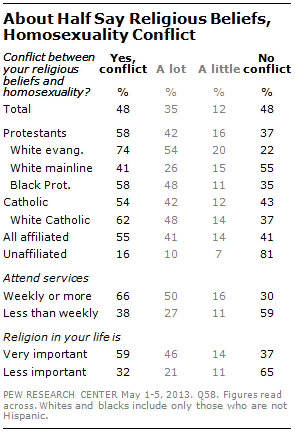 their religious beliefs and homosexuality.
their religious beliefs and homosexuality.
Among those who attend religious services weekly or more, 66% say homosexuality conflicts with their religious beliefs, with 50% saying there is a great deal of conflict. Most people (59%) who attend religious services less than once a week see no conflict between their beliefs and homosexuality.
Fully 74% of white evangelical Protestants say there is a conflict between homosexuality and their religious beliefs, as do majorities of white Catholics (62%) and black Protestants (58%).
Among white mainline Protestants, however, 41% say there is a conflict between their religious beliefs and homosexuality, while 55% see 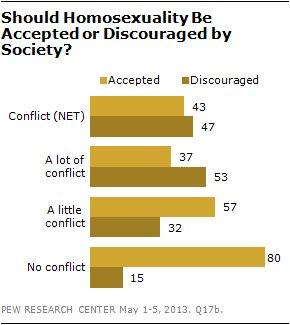 no conflict.
no conflict.
The tension between religious beliefs and homosexuality is closely associated with views about societal acceptance of homosexuality. Among those who see a lot of conflict between their own religious beliefs and homosexuality, a majority (53%) opposes societal acceptance. Those who see a little conflict between religion and homosexuality favor societal acceptance by 57% to 32%. And 80% of those who say there is no conflict between their religious beliefs and homosexuality support societal acceptance.
Fewer See Homosexual Behavior as a Sin
The public is divided over whether engaging in homosexual behavior is a sin: 45% say it 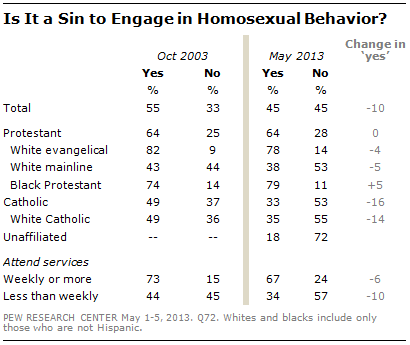 is a sin while an identical percentage says it is not. In 2003, a majority (55%) viewed homosexual behavior as was sinful, while 33% disagreed.
is a sin while an identical percentage says it is not. In 2003, a majority (55%) viewed homosexual behavior as was sinful, while 33% disagreed.
Among several religious groups, there has been relatively little change in these opinions over the past decade. Fully 78% of white evangelical Protestants view homosexual behavior as a sin; 82% said this in 2003. About as many black Protestants view homosexuality as a sin today (79%) as did so ten years ago (74%).
However, opinions among Catholics have changed substantially. In 2003, more Catholics said homosexual behavior was a sin than said it was not (49% vs. 37%). Today, a third of Catholics (33%) say it is sin, while 53% disagree.
People who attend religious services weekly or more continue to view homosexual behavior as a sin by a wide margin (67% to 24%). Nearly six-in-ten (57%) of those who attend less often think such behavior is not a sin, while 34% say it is; 10 years ago, opinion was divided (44% sin, 45% not a sin).
 Opinions about whether homosexuality is sinful – as well as views about the conflict between religious beliefs and homosexuality – are highly associated with attitudes toward gay marriage.
Opinions about whether homosexuality is sinful – as well as views about the conflict between religious beliefs and homosexuality – are highly associated with attitudes toward gay marriage.
Nearly three-quarters (74%) of those who say engaging in homosexual behavior is a sin oppose same-sex marriage. An even larger percentage (84%) of those who say it is not sinful favor gay marriage.
The gap in opinions about gay marriage is nearly as wide between those who say there is a lot of conflict between homosexuality and their religious beliefs (67% oppose gay marriage) and those who see no conflict (71% favor gay marriage).
Similarly, those who say religion is very important in their lives are only half as likely to support gay marriage as those who place less importance on religion (36% favor vs. 72% favor).


 Voices
Voices Graphic
Graphic